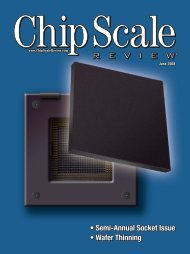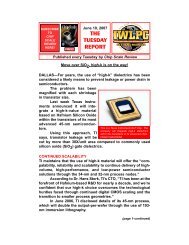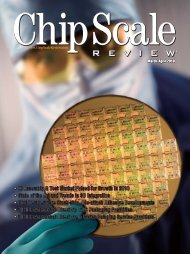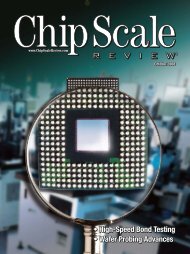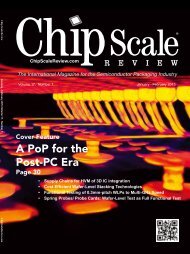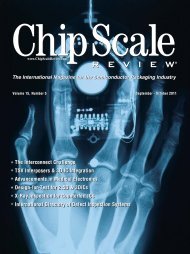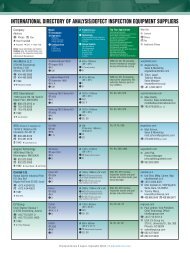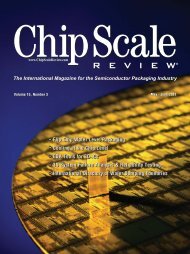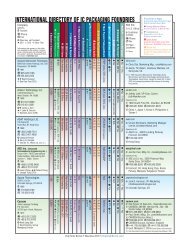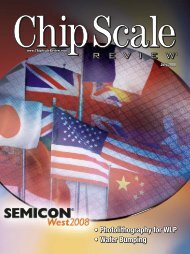industry news - Chip Scale Review
industry news - Chip Scale Review
industry news - Chip Scale Review
Create successful ePaper yourself
Turn your PDF publications into a flip-book with our unique Google optimized e-Paper software.
INDUSTRY NEWS<br />
Packaging Industry Veteran Opens Technical Sales Firm<br />
From left, Augustine Yap, Cristel Technologies; Takehiko Murakami, Minami; Yoshihiro Shimada of PacVision<br />
Corp., Japanese rep for Minami and PTA; Danny Fields; S.Y. Lee and Celina See, both of PTA.<br />
San Jose—Danny Fields, a 20-year<br />
veteran of the semiconductor packaging<br />
<strong>industry</strong>, has founded Pacific Gate<br />
Technologies, a technical sales firm.<br />
For nearly a decade, Fields was sales<br />
director for IPAC/i2a, San Jose, a<br />
provider of advanced semiconductor<br />
packaging and test.<br />
He earlier held similar titles and posts<br />
at AIS and AME/IMI, semiconductor<br />
assembly vendors offshore.<br />
Pacific Gate’s initial clients are Minami<br />
of Fuchu City, Japan [ho-minami.co.jp],<br />
a maker of screen printing and reflow<br />
systems for surface mount and device<br />
packaging; and PTA [polarta.com],a<br />
provider of IC assembly services based<br />
in Penang, Malaysia.<br />
Minami offers a low-cost screen<br />
printing system for wafer-level CSPs,<br />
with ball diameters ranging from 95 to<br />
500 microns. [pacgate-us.com]<br />
Silicon Nanowire Biochip Will Speed Genetic Tests<br />
Singapore—A new, highly sensitive<br />
biochip, based on silicon nanowire technology,<br />
will revolutionize the detection<br />
and analysis of RNA and DNA, according<br />
to its developers.<br />
The biochip will be produced through<br />
the combined efforts of Singapore’s<br />
Institute of Microelectronics (IME),<br />
Australian-based Bio<strong>Chip</strong> Innovations<br />
and SiMEMS, also of Singapore.<br />
The biochip, according to the developers,<br />
will shorten the time for genetic<br />
testing by directly detecting single DNA<br />
or RNA molecules. Because of their<br />
nanometer scale, silicon nanowires<br />
enable a greater sensitivity of detection.<br />
The nanowires can also detect biomarkers<br />
and other bio-molecules such<br />
as bacterial, viral and other specific<br />
genetic sequences.<br />
Uppili Raghavan, SiMEMS CEO, says<br />
most biochip systems now in use or<br />
IME is developing a nanowire biochip in a joint program<br />
with an Australian and Singaporean company.<br />
under development employ complex<br />
and expensive optics, signal processing<br />
systems and data interpretation, “all of<br />
which are impediments to adoption by<br />
the diagnostics <strong>industry</strong>.”<br />
The nanowire devices can be manufactured<br />
in standard CMOS silicon<br />
foundries, allowing them to be mass<br />
produced “reliably and cost-effectively,”<br />
Raghavan says.<br />
<strong>Chip</strong> <strong>Scale</strong> <strong>Review</strong> ■ March 2007 ■ [<strong>Chip</strong><strong>Scale</strong><strong>Review</strong>.com] 23



